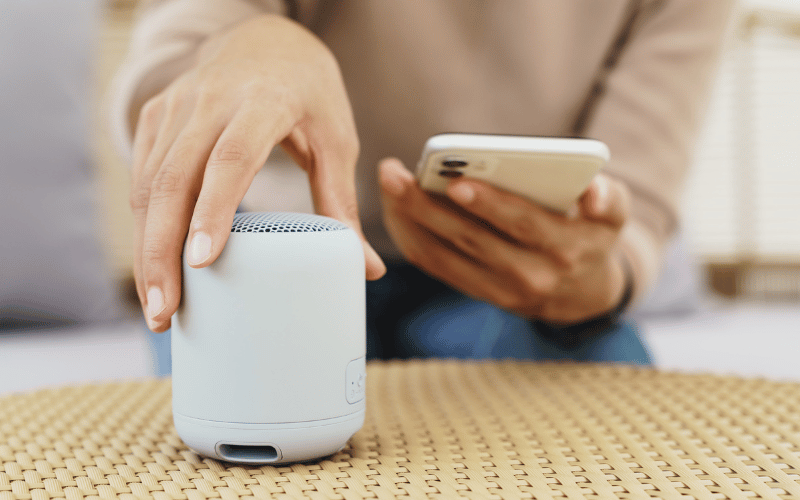If you live with tinnitus, you may have noticed it feels louder when everything is quiet. This is not just in your head. There’s a scientific reason behind this experience, and knowing why it happens can help you feel more in control. Today, we will explore why silence seems to amplify tinnitus and how some of the most effective treatments of tinnitus work by gently reintroducing sound.
Why silence makes tinnitus seem louder
When your surroundings are quiet, there is less sound to compete with the noise in your ears. The ringing, buzzing, or hissing becomes the only thing your brain hears. It’s not that your tinnitus actually gets louder. Tinnitus doesn’t increase in volume; it just becomes more noticeable.
"Treble Health helped me turn down the sound of my tinnitus. Now I can breathe, and get on with my life!"

"Treble Health helped me turn down the sound of my tinnitus. Now I can breathe, and get on with my life!"
– Elisa
Book a free consultation to learn which Treble Health solution is right for you. Join Elisa and thousands more who have found lasting tinnitus relief.
Your brain is constantly searching for input. Without outside sounds, it turns inward and amplifies whatever it can detect, often your tinnitus. This is why many treatments for tinnitus focus on reintroducing soft, consistent sounds into your environment.
Understanding the Role of Attention
Tinnitus often grabs your attention because there’s little else for your brain to focus on. The more you pay attention to the sound, the more noticeable it becomes. Redirecting that attention is a powerful part of managing your response. This is why sound therapy and distraction techniques can be so effective.
Why your brain turns up the volume
This is what audiologists refer to as sensory gain. Your brain tries to make up for the lack of external sound by increasing its sensitivity to internal signals. The result is that the sound of your tinnitus becomes clearer.
As explained in the Treble Health video Why does my tinnitus get louder sometimes, at the 2:32 mark, Ben Thompson says:
“If tinnitus is the only stimulus in the room, then I’m likely to focus on it.”
This is why treatments of tinnitus often involve low-level ambient sounds. These sounds give your brain something else to focus on.
Is it normal to hear high-pitched sounds in silence?
Yes, it’s quite normal! Even people without tinnitus can perceive faint, high-pitched tones in a completely silent room. A study published in Otolaryngology–Head and Neck Surgery investigated this phenomenon, finding that 64% of healthy adults heard tinnitus-like sounds after sitting in silence for 20 minutes.

The study, which involved 120 normal-hearing young adults, documented the most common sounds perceived in silence:
- Ringing (57%)
- Buzzing (21%)
- Pulsing (22%)
This research highlights that while persistent, bothersome tinnitus is a medical condition, the mere perception of sound in profound silence is a common experience, demonstrating the brain’s natural sensitivity to internal auditory signals when external noise is absent.
Why tinnitus feels worse at night
Many people say their tinnitus gets worse at night. The reason? Background sounds disappear. There’s no traffic, no TV, and often no fan running. Your brain, trying to stay alert, latches onto the internal sound of your tinnitus.
A study of 258 patients found that 48% said being in a quiet place made their tinnitus worse, while 31% reported that background noise helped reduce it. This supports why tinnitus often feels more noticeable at night when environmental sounds fade.
To ease nighttime symptoms:
- Try a white noise machine
- Leave a fan running
- Play soft rain or nature sounds
These sound-based approaches are often part of effective tinnitus treatments, especially for those whose symptoms worsen in silence

The Mental Load of Silence
Silence may feel peaceful to some people, but for those with tinnitus, it can bring a subtle kind of mental strain. Your brain works harder trying to interpret what it hears or does not hear. This constant internal effort can make tinnitus more exhausting than people might expect. Even soft background sounds can ease this burden.
Your brain wants sound, not silence
Your brain is constantly monitoring sensory input and isn’t designed for complete silence. In the absence of external sound, it can actively create its own internal signals, which may be perceived as tinnitus.
A 2007 study in The Journal of Neuroscience explains this phenomenon: when normal auditory input is missing due to factors like cochlear damage, the brain’s central auditory system undergoes reorganization. This leads to changes in its ongoing activity, specifically an enhancement of certain brainwave patterns (like slow-wave and gamma activity). This enhanced internal activity then becomes the neural code for a “phantom perception”, which is what we interpret as tinnitus. Essentially, when silence reigns, your brain’s altered internal noise becomes more prominent.
Building a Supportive Environment
You do not need to make big changes. Small adjustments to your routine, such as playing calming sounds in the background or reducing overstimulation, can lead to real improvements. A steady and consistent sound environment helps your brain stay more balanced, even during quiet moments.

How quiet environments change perception
It’s not just your ears. Quiet spaces can also affect your nervous system. Silence may trigger a mild stress response, causing you to become more sensitive to sound. This makes your brain more likely to pick up on internal noises, like tinnitus.
Moving from a noisy place to a quiet one may give the impression that your tinnitus has become worse. In most cases, it’s the change in contrast that makes it seem louder.
A strategy to lower the contrast
Using background noise helps your brain stay grounded. This is known as sound enrichment. Instead of focusing on silence, you create an environment where the sound of tinnitus blends in.
Think of it like this. A candle in a dark room draws your full attention. But when the lights are on, that same candle barely stands out. Tinnitus works the same way.
Free-field speakers, Bluetooth headphones, or simple white noise apps can all reduce the contrast and help your brain stop tuning in to the internal ringing.
The Power of Routine
Creating a structure around sound, such as listening to relaxing music in the morning or ambient noise during the evening, helps your nervous system adjust. Routine gives your brain something it can predict, and this predictability can lessen the emotional response connected to tinnitus.
Take Control of Your Tinnitus
Tinnitus often feels louder in quiet moments. The sound itself isn’t getting worse, but your brain becomes more aware of it when there are no outside distractions. Recognizing this is the first step toward changing how you experience it.
Effective treatments of tinnitus are not about turning the sound off. They focus on helping your brain respond differently. Techniques like sound therapy, relaxation strategies, and personalized support can make a real difference. Relief comes when your brain has something else to focus on besides the ringing.
You do not have to go through this alone. At Treble Health, our audiologists specialize in treatments of tinnitus that are tailored to your needs. Whether your symptoms peak during the day or night, we help you retrain your brain and restore balance.
Take the first step toward relief. Schedule a free consultation with Treble Health. Thousands have already found a way to quiet their tinnitus. You could be next.
Next Step: Book Free Consultation
- 75% of patients reduced their tinnitus within three months after following our recommendations.
- "I feel like Treble Health literally gave me my life back." - Randy S. (verified customer)
- Join thousands of people who have reduced their tinnitus after scheduling a free consultation.















